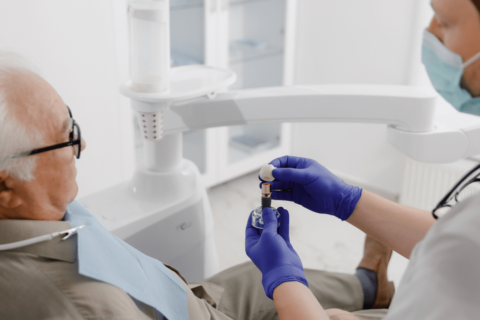How Gum Disease Affects Your Overall Health
If you’ve ever noticed your gums bleeding when brushing or flossing, you probably didn’t think much of it. It happens, right? But did you know that bleeding gums could be a sign of gum disease—and that it might be doingdentalblogs more than just affecting your smile?
Gum disease, or periodontal disease, isn’t just about red, swollen gums or bad breath. It can actually impact your entire body in ways you might not expect. Here’s why keeping your gums healthy is a crucial part of taking care of your overall health.
What Exactly is Gum Disease?
Gum disease starts with gingivitis—that’s when your gums get inflamed and may bleed when you brush or floss. If you catch it early, gingivitis is reversible with good oral care. But if it’s left untreated, it can turn into periodontitis, which can cause serious damage to your gums, and the bones that support your teeth, and even lead to tooth loss.
But here’s where it gets even more serious—gum disease doesn’t just stay in your mouth. It can affect your whole body.
How Gum Disease Can Impact Your Health
1. Your Heart Could Be at Risk
It’s hard to believe that your gums can affect your heart, but research has shown a real connection. The bacteria from gum disease can enter your bloodstream and contribute to inflammation in your arteries. Over time, this can lead to plaque buildup in your arteries, increasing your risk for heart disease and stroke. In fact, people with gum disease are almost twice as likely to have heart issues.
So, if you’ve been brushing off those bleeding gums as “no big deal,” it might be time to think again—your heart could be paying the price.
2. Diabetes and Gum Disease: A Two-Way Street
If you or someone you know has diabetes, you understand how challenging it can be to manage blood sugar levels. Here’s the kicker: gum disease can make that even harder. The inflammation from gum disease affects how your body processes insulin, which can lead to poor blood sugar control.
And if you already have diabetes, you’re more prone to infections, including gum disease. It’s a vicious cycle, but managing your gum health can help keep your blood sugar levels in check.
3. It Can Affect Your Lungs Too
You probably don’t think about your lungs when you’re brushing your teeth, but the connection is real. The bacteria from gum disease can make their way into your lungs, potentially leading to infections like pneumonia. If you have any chronic lung conditions, such as COPD, untreated gum disease can make things worse by introducing even more bacteria into your respiratory system.
This is especially important to consider if you’re older or have existing health issues—your gum health can directly impact your ability to breathe easier.
4. Pregnancy and Gum Disease Don’t Mix Well
If you’re pregnant or planning to be, you’re already focused on doing everything you can for a healthy baby. But did you know that untreated gum disease can increase the risk of premature birth and low birth weight? The bacteria and inflammation from gum disease don’t just stay in your mouth—they can spread through your bloodstream and affect your pregnancy.
That’s why taking care of your gums is especially important when you’re expecting. Regular dental checkups and good oral hygiene aren’t just about protecting your smile—they’re about protecting your baby too.

5. Joint Pain and Gum Disease: A Surprising Connection
You might not think there’s any link between your gums and your joints, but there’s a connection between gum disease and rheumatoid arthritis (RA). Both conditions cause inflammation, and research suggests that people with gum disease are more likely to have RA. Inflammation from one can actually make the other worse.
The good news? Taking care of your gums might help reduce some of the inflammation that causes joint pain in RA patients.
Simple Ways to Keep Your Gums—and Your Body—Healthy
The idea that your gums can impact your overall health might feel overwhelming, but the good news is that there’s a lot you can do to keep things under control. Here are some simple steps:
- Brush Regularly: Twice a day with a soft-bristle toothbrush. It’s the easiest way to fight plaque buildup that leads to gum disease.
- Don’t Forget to Floss: We know—it’s easy to skip. But flossing helps remove the food particles and plaque between your teeth that brushing can’t reach.
- See Your Dentist: Regular cleanings and checkups can catch gum disease early, and professional cleanings remove the tartar that brushing and flossing can miss.
- Eat for Your Gums: A healthy diet rich in vitamins and minerals, like calcium and vitamin C, can help strengthen your gums and immune system.
- Quit Smoking: Smoking weakens your immune system, making it harder to fight off a gum infection.
Your Gums Matter—For More Than Just Your Smile
At the end of the day, taking care of your gums isn’t just about avoiding tooth loss or bad breath. It’s about protecting your body from the harmful effects of inflammation and bacteria that come with gum disease. Whether it’s your heart, your lungs, or even your baby’s health, gum disease can have a much bigger impact than you think.
If you’re experiencing any signs of gum disease—like bleeding gums, bad breath, or sensitivity—now is the time to take action. Schedule an appointment with us to get your gums back on track and protect your overall health.


